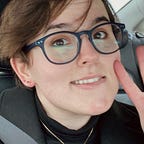See Me
In an unapologetic reclamation of space and time, Women’s History Month speaker Feminista Jones shone a light on sides of feminism that are routinely in shadow.
“Loving freedom is the hardest thing of all, because how does someone love something they have never known?” Jones asked. “If any of us aren’t completely free to live unencumbered, facing no obstacles simply because of how we are identified, are any of us ever really free?”
Jones was one of several Women’s History Month speakers at Western. She is an author, public speaker, community activist and feminist working to uplift marginalized women. She visited Western as part of a tour for her book, “Reclaiming Our Space: How Black Feminists Are Changing the World from the Tweets to the Streets,” which explores the impacts of black women on activist movements.
Jones opened her speech with a startling statistic: the estimated value of enslaved people in Missouri five years prior to the Civil War was roughly $44 million. In today’s money, that number is well over $1 trillion. If you’re wondering what this much money looks like, it’s close to the entire U.S. national debt in 1983.
“Their descendants continue to live here, suffering under the oppression of racist tyranny,” Jones said. “They have not received a cent.”
In addition to discussing the economic injustices faced by black people in the U.S., Jones examined a variety of hardships faced disproportionately by black women and other women of color.
She has recently been featured in Vox and TIME for her writing on the dangers black women face with harassment and domestic violence. She recommended students looking to make change put their efforts into women’s shelters.
“They are sorely underfunded and they don’t get items that they need,” Jones said. “A lot of those women, they grab their children and they go.” Jones said that, rather than just donating canned goods, students could donate things like hotel toiletries. With changes to welfare services and education looming, she also encouraged students to oppose cuts to these programs by contacting their representatives at both the city and state level.
“I want people to start fighting back,” Jones said. “Let your voices be heard.”
Jones’ voice was heard loud and clear by many students, such as junior Brenae Tate.
“It was very inspirational for me, personally,” Tate said. “She has the background of a lot of black women. For her to be where she is now just shows that we’re allowed to do that.”
Tate was one audience member addressed during a lively post-speech Q&A session that discussed topics from interracial friendships to reconciling misogyny in hip hop culture. Latoya Muhammad, director of the Center for Multicultural Education, appreciated that the event considered a wide variety of issues facing women and could appeal to a large group of students.
“I love the fact that she focuses on intersectional feminism,” Muhammad said. “There are many other things that she talks about, so it really does help to kind of bring it all under one umbrella.”
Concerning the roles of colleges and educators in the fights against racism and misogyny, teaching the ability to communicate was key, according to Jones.
“Students need critical thinking, because they seem to have stopped teaching that a long time ago,” Jones said. “Schools can do more to facilitate those conversations. Bring students together; bring in more diverse speakers — folks that they’ve never heard of. Expose them to new thoughts.”
Jones has taken many different routes of advocacy throughout her lifetime. She pursued social work as an alternative to a law career in order to more directly uplift women of color facing violence, poverty and displacement. She retired from social work shortly before the release of her most recent book and tours many colleges and organizations.
“I really love this,” Jones said. “I moved away from leading the marches and organizing those kinds of things to actually coming and doing more intimate conversations, because I feel like that’s where I have the direct impact.”
Jones outlined many different means through which students could become involved in activism while still in school.
“I would encourage students, especially if they’re feeling marginalized, to go outside of college,” Jones said. “Go into the local community; look up some organizations that may exist that are in your interest. If something doesn’t exist, make it; create it.”
Jones showed Western many seldom-addressed faces of racism and misogyny, but her proactive teaching and passion instilled the notion that students could make big impacts by reaching out to their classmates and community with love.
